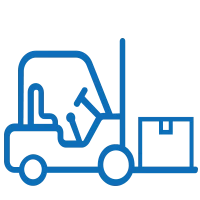Technological advancements, evolving consumer demands, and a growing emphasis on sustainability are set to be key drivers in the warehouse and logistics industry for 2025. Here we explore some of the industry trends to watch and how they may impact on materials handling equipment.
- Warehouse Automation
Warehouse automation remains a buzzword in modern logistics operations in 2025. Companies are investing heavily in automated solutions to streamline operations, address labour challenges, and meet the increasing demand for faster deliveries while tackling operational cost constraints.
The rising interest in automation across all parts of the warehouse means that attention will also turn to automated solutions for tasks traditionally done by materials handling equipment like forklift trucks, order pickers, and pallet stackers. Robotic solutions can work alongside human workers to enhance productivity. Handling repetitive tasks, they can allow human workers to focus on more complex activities.
In the new year, warehouse managers can expect to see more automated options, and robotic equipment becoming more sophisticated.
AI also holds promise for logistics operations, suggesting it can enable smarter decision-making and enhance operational efficiency. For example, by predicting maintenance needs or optimising routes within warehouses. In the longer term, this may reduce downtime and extend the lifespan of equipment.
- Data-Driven Decision Making
The right data can provide valuable insights to drive strategic decision-making. Intralogistics operations can expect to be exploring this more in the year ahead. Data on inventory levels, shipment status, and environmental conditions, can enable real-time visibility across the supply chain. What’s more, by analysing data from various sources, businesses can identify inefficiencies, optimise processes, and reduce costs.
Much like in other industries, across the warehouse and logistics industry, desire to equip lift trucks and warehouse trucks with telematics systems may grow, as organisations seek more real-time data on equipment status and performance. This may help enable effective planned maintenance, reducing the risk of equipment failure and improving operational efficiency.
- Green Logistics
Sustainability goals are already a focus for many warehouse operations, driven by regulatory requirements and consumer expectations. As we move into 2025 and EU emissions target deadlines creep closer, we can expect warehouses to adopt even more energy-efficient technologies and practices across their materials handling fleets. For example, many logistics companies are investing in electric forklifts that can operate both indoors and outdoors, to not only reduce carbon emissions and lower operating costs, but also to help right-size their fleets.
The push for sustainability will continue to put pressure on manufacturers when it comes to the development of eco-friendly and sustainable materials handling equipment. They will not only need to provide a range of solutions for electric forklifts and other battery-powered equipment. But also to consider improving the efficiency and footprint of models with IC engines.
Extending the useful life of equipment, including supporting the refurbishment of used trucks, will also be an important consideration for many businesses when considering their credentials around waste.
- Urban Warehousing and Last-Mile Delivery
The trend towards urban warehousing is likely to continue into 2025, driven by the need for faster deliveries and reduced transportation costs. This shift will require materials handling equipment that is compact, agile, and capable of operating in smaller, fast-moving warehouses.
Additionally, innovative delivery methods such as drones and robots may be introduced to more operations. In the near future, this may impact the design and use of materials handling equipment.
What will 2025 warehousing and logistics trends mean for you?
The trends shaping the warehouse and logistics industry in 2025 may have a profound impact on materials handling technology and how you employ equipment in your intralogistics operation. Embracing the latest trends may help some companies to be better positioned to meet the demands of the future and maintain a competitive edge in the industry. Though matching the right solutions to the specific application requirements will remain the route to efficiency and success.
Talk to your local Yale dealer
Discover technologies to suit your particular operation requirements including the latest materials handling equipment, robotics, and telematics solutions from Yale Lift Truck Technologies. Contact your local Yale dealer to find out more.


